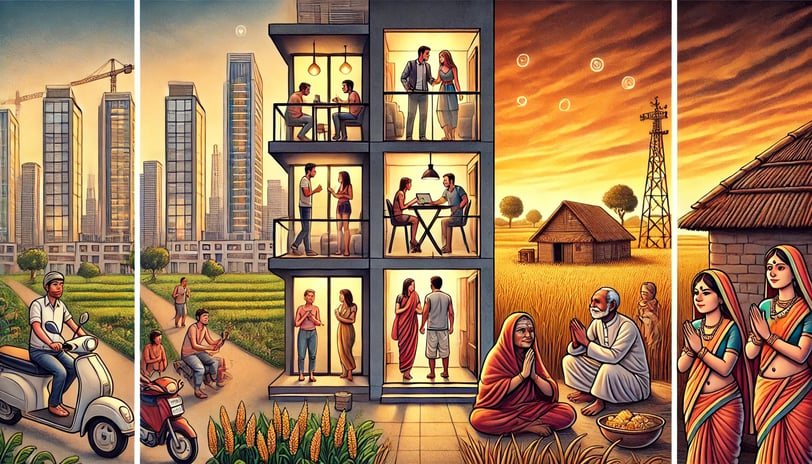Live-In Relationships: Ruining Our Culture?
Himanshu Gupta
CPJ College Of Higher Studies And School Of Law
This blog is written by Himanshu Gupta, a Fourth-Year Law Student of CPJ College Of Higher Studies And School Of Law


INTRODUCTION
Live-in relationships can be defined as the cohabitation of couples without being legally married. In India, there are no special laws that govern this kind of relationship but they are being termed as not illegal by the Supreme Court of India.
Live-in relationships have always been popular in Western culture as they provide personal freedom, compatibility checks with the partner, etc. In India, also this trend is picking up pace rapidly, especially in the metro cities.
Nowadays, couples prefer to live in relationships as there are fewer restrictions and responsibilities as compared to marriage. In India, live-in relationships are considered legal by the Supreme Court of India but a taboo persists as Indian culture does not promote such kind of things and treats it as a cultural crime.
Due to rapid urbanization, there can be seen a significant increase in live-in relationships. There can be a gradual shift in the acceptance of this kind of relationship.
KEY ASPECTS OF LIVE-IN RELATIONSHIP
· LEGAL STATUS
In India, live-in relationships are not governed by any legal provisions but it was considered legal in the ruling of the Supreme Court in the case of Khusboo V. Kanniammal, 2010, where it was stated that live-in relationships are not illegal nor immoral.
· SOCIAL ACCEPTANCE
Live-in relationships are still not widely socially accepted in various parts of India. It is considered immoral and uncultural in Indian traditions. It is also argued that live-in relationships are ruining Indian culture. Due to non-acceptance couples have to face social stigma and backlash from society.
· FINANCIAL CONSIDERATION
In live-in relationships, both partners split their living expenses and resources which help them sustain in society for a longer duration but in some cases, it may act vice versa as during separation due to the absence of legal provisions the parties can face financial difficulties.
· PERSONAL AUTONOMY AND FLEXIBILITY
Couples prefer live-in relationships because they get more freedom and control over their choices. They are not bound to be in that relationship if it doesn’t suit them.
· PARENTAL RIGHTS
The Supreme Court of India ruled that the children arising out of live-in relationships will be considered legitimate and have the right over the property owned by the parents.
· RIGHT OF PARTIES
Living in a relationship is not governed by any provisions so parties in life do not have many rights like married couples. They have some rights like the Supreme Court ruled that if a couple is in living in in relationship for a considerably good time, then they will be presumed to be married.
In the case of D. Velusamy v. D. Patchaimmal, the Supreme Court of India held that if there is enough evidence available on record to show that the couple has been living together for a considerably long time then in this situation that live-in relationship can be presumed as a valid marriage.
In the case of Payal Sharma v. V.N. Talwar, 2018, the Delhi High Court held that a woman living in a live-in relationship is entitled to the same rights as a legally wedded woman under the Hindu Marriage Act, 1955. The child born out of such a relationship is also entitled to maintenance under the Hindu Adoption and Maintenance Act, of 1956.
CONCLUSION
Live-in relationships are starting to be widely accepted in metro cities like Delhi, Mumbai, Bangalore, etc but they are still seen as a cultural crime in many parts of India particularly in villages and small towns. They treat these types of relationships as against the Indian culture.
Couples living in live-in relationships in small cities may face criticism, social invalidation, and backlash from the community.
REFERENCES
· kk, Sanjay (no date) Live-in relationship: Laws in India, Legal Service India - Law, Lawyers and Legal Resources. Available at: https://www.legalserviceindia.com/legal/article-10718-live-in-relationship-laws-in-india.html, (Accessed: 04 September 2024).
· Understanding the law on live-in relationships in India (2022) Nyaaya. Available at: https://nyaaya.org/nyaaya-weekly/understanding-the-law-on-live-in-relationships-in-india/ (Accessed: 04 September 2024).
· Desk, S. (2024) Live in relationship laws in India: The Supreme Court rules, Vakilsearch. Available at: https://vakilsearch.com/blog/live-in-relationship-law/ (Accessed: 04 September 2024).
· Salam, Z.U. (2024) What is the legal position on live-in relationships?: Explained, The Hindu. Available at: https://www.thehindu.com/news/national/what-is-the-legal-position-on-live-in-relationships-explained/article68172438.ece#:~:text=India%20does%20not%20have%20any,is%20no%20longer%20an%20offence. (Accessed: 04 September 2024).
· Lloyd Law College (2022) Live-in relationship: Legal rights of live-in partners in India, Lloyd Law College I Best law college in India. Available at: https://lloydlawcollege.edu.in/blog/legal-right-of-live-in-partners-in-india.html (Accessed: 04 September 2024).
